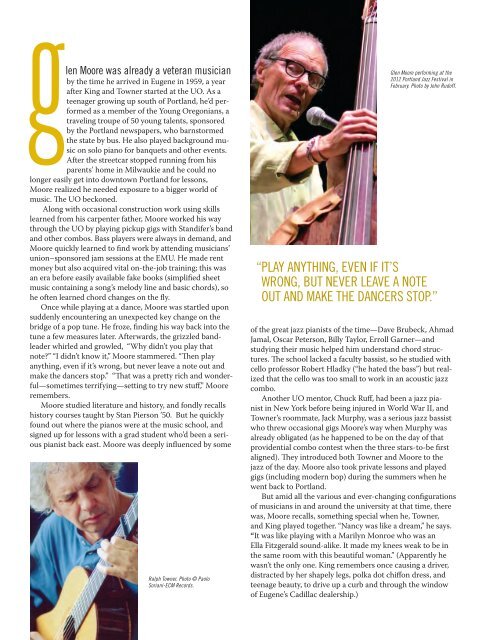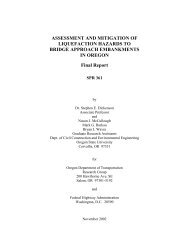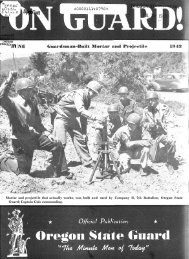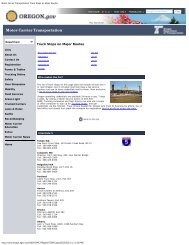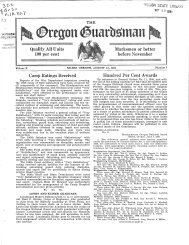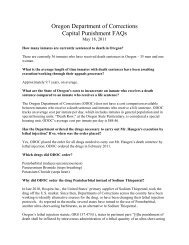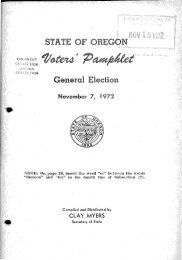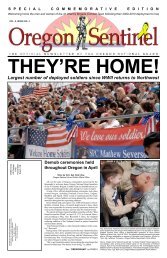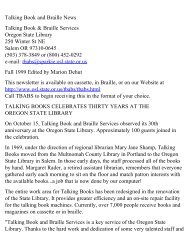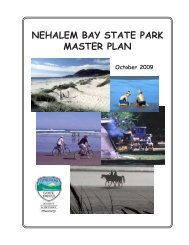Summer 2013 - Oregon State Library: State Employee Information ...
Summer 2013 - Oregon State Library: State Employee Information ...
Summer 2013 - Oregon State Library: State Employee Information ...
You also want an ePaper? Increase the reach of your titles
YUMPU automatically turns print PDFs into web optimized ePapers that Google loves.
glen Moore was already a veteran musician<br />
by the time he arrived in Eugene in 1959, a year<br />
after King and Towner started at the UO. As a<br />
teenager growing up south of Portland, he’d performed<br />
as a member of the Young <strong>Oregon</strong>ians, a<br />
traveling troupe of 50 young talents, sponsored<br />
by the Portland newspapers, who barnstormed<br />
the state by bus. He also played background music<br />
on solo piano for banquets and other events.<br />
After the streetcar stopped running from his<br />
parents’ home in Milwaukie and he could no<br />
longer easily get into downtown Portland for lessons,<br />
Moore realized he needed exposure to a bigger world of<br />
music. The UO beckoned.<br />
Along with occasional construction work using skills<br />
learned from his carpenter father, Moore worked his way<br />
through the UO by playing pickup gigs with Standifer’s band<br />
and other combos. Bass players were always in demand, and<br />
Moore quickly learned to find work by attending musicians’<br />
union–sponsored jam sessions at the EMU. He made rent<br />
money but also acquired vital on-the-job training; this was<br />
an era before easily available fake books (simplified sheet<br />
music containing a song’s melody line and basic chords), so<br />
he often learned chord changes on the fly.<br />
Once while playing at a dance, Moore was startled upon<br />
suddenly encountering an unexpected key change on the<br />
bridge of a pop tune. He froze, finding his way back into the<br />
tune a few measures later. Afterwards, the grizzled bandleader<br />
whirled and growled, “Why didn’t you play that<br />
note?” “I didn’t know it,” Moore stammered. “Then play<br />
anything, even if it’s wrong, but never leave a note out and<br />
make the dancers stop.” “That was a pretty rich and wonderful—sometimes<br />
terrifying—setting to try new stuff,” Moore<br />
remembers.<br />
Moore studied literature and history, and fondly recalls<br />
history courses taught by Stan Pierson ’50. But he quickly<br />
found out where the pianos were at the music school, and<br />
signed up for lessons with a grad student who’d been a serious<br />
pianist back east. Moore was deeply influenced by some<br />
Ralph Towner. Photo © Paolo<br />
Soriani-ECM Records.<br />
Glen Moore performing at the<br />
2012 Portland Jazz Festival in<br />
February. Photo by John Rudoff.<br />
“PLAY ANYTHING, EVEN IF IT’S<br />
WRONG, BUT NEVER LEAVE A NOTE<br />
OUT AND MAKE THE DANCERS STOP.”<br />
of the great jazz pianists of the time—Dave Brubeck, Ahmad<br />
Jamal, Oscar Peterson, Billy Taylor, Erroll Garner—and<br />
studying their music helped him understand chord structures.<br />
The school lacked a faculty bassist, so he studied with<br />
cello professor Robert Hladky (“he hated the bass”) but realized<br />
that the cello was too small to work in an acoustic jazz<br />
combo.<br />
Another UO mentor, Chuck Ruff, had been a jazz pianist<br />
in New York before being injured in World War II, and<br />
Towner’s roommate, Jack Murphy, was a serious jazz bassist<br />
who threw occasional gigs Moore’s way when Murphy was<br />
already obligated (as he happened to be on the day of that<br />
providential combo contest when the three stars-to-be first<br />
aligned). They introduced both Towner and Moore to the<br />
jazz of the day. Moore also took private lessons and played<br />
gigs (including modern bop) during the summers when he<br />
went back to Portland.<br />
But amid all the various and ever-changing configurations<br />
of musicians in and around the university at that time, there<br />
was, Moore recalls, something special when he, Towner,<br />
and King played together. “Nancy was like a dream,” he says.<br />
“It was like playing with a Marilyn Monroe who was an<br />
Ella Fitzgerald sound-alike. It made my knees weak to be in<br />
the same room with this beautiful woman.” (Apparently he<br />
wasn’t the only one. King remembers once causing a driver,<br />
distracted by her shapely legs, polka dot chiffon dress, and<br />
teenage beauty, to drive up a curb and through the window<br />
of Eugene’s Cadillac dealership.)<br />
THE MAGAZINE OF THE UNIVERSITY OF OREGON 47


